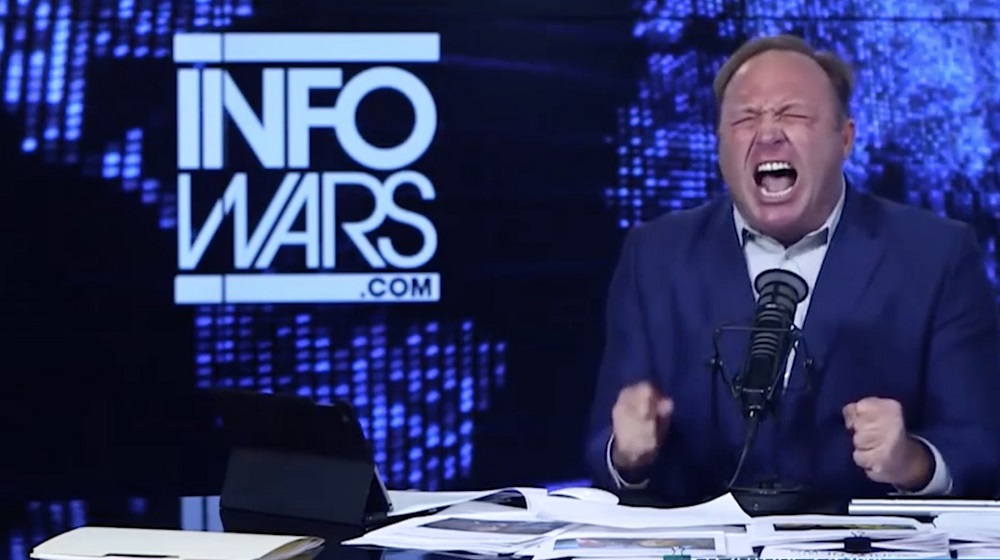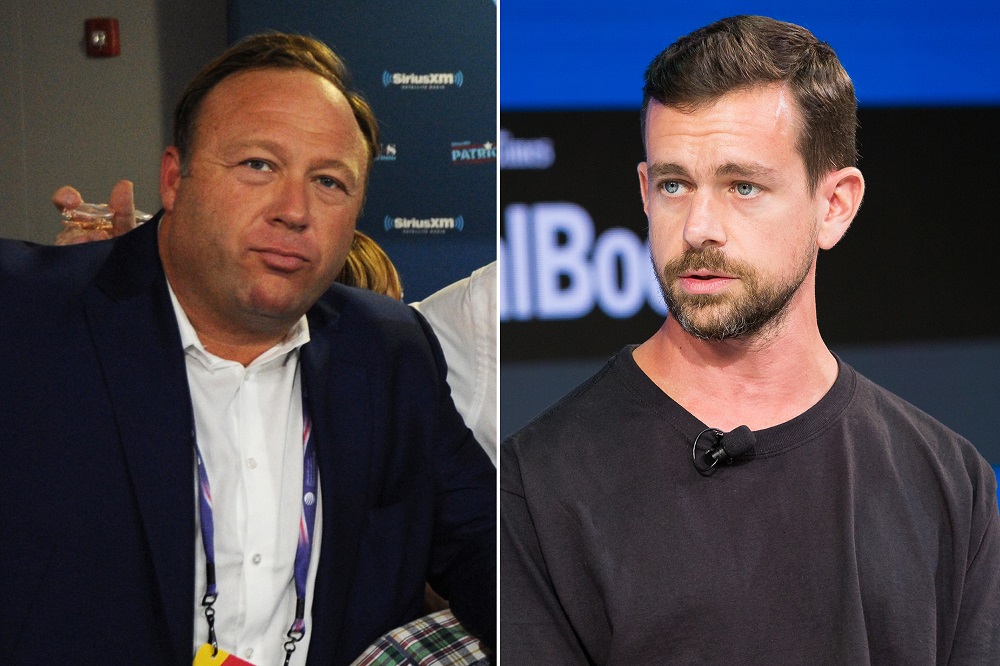
As someone who has known Alex Jones for over a decade, he is enjoying every minute of playing censorship victim. When social media platforms began shutting down his accounts, it gave him more angry rant videos to make rousing up his patriot movement followers along with getting his name back out again in the mainstream news. As with Donald Trump, Alex knows how to work the media to keep the money flowing into his bank accounts.
Now that Twitter has made their decision to not ban his account, this takes a bit of steam out of Jones argument that all or corporate America is trying to censor him. “Alex knows he goes too far, and he revels in that since he’s able to gain media attention from it,” a former worker at InfoWars said. “This is why he loves Donald Trump so much because they work from the exact same media blueprint and love all the negative attention they receive. With Twitter not banning his account, Alex can’t claim that everyone is out to get him after all.”

Twitter CEO Jack Dorsey defended his company’s decision not to ban right-wing conspiracy theorist Alex Jones and his “Infowars” show, as many other social media platforms have done, saying he did not break any rules.
Facebook, Apple, YouTube and Spotify took down over the past week material published by Jones, reflecting more aggressive enforcement of their hate speech policies after rising online backlash and raising pressure on Twitter to do the same.
Jones’ Facebook account has also been suspended for 30 days, but he still has a “verified” Twitter account. A separate Twitter account for “Infowars” is also still running.
“We didn’t suspend Alex Jones or Infowars yesterday,” Dorsey said in a series of tweets late Tuesday. “We know that’s hard for many, but the reason is simple: he hasn’t violated our rules. We’ll enforce if he does.”
Dorsey said Twitter did not want to take “one-off actions to make us feel good in the short term, and adding fuel to new conspiracy theories.”
He said he wanted the company to avoid succumbing to outside pressure but instead impartially enforce straightforward principles “regardless of political viewpoints.” He also linked to a blog post Tuesday by the company’s vice president for trust and safety, Del Harvey, outlining the company’s policies.
“Twitter is reflective of real conversations happening in the world, and that sometimes includes perspectives that may be offensive, controversial, and/or bigoted,” she said. “While we welcome everyone to express themselves on our service, we prohibit targeted behavior that harasses, threatens, or uses fear to silence the voices of others.”
Twitter is reflective of real conversations happening in the world and that sometimes includes perspectives that may be offensive, controversial, and/or bigoted. While we welcome everyone to express themselves on our service, we prohibit targeted behavior that harasses, threatens, or uses fear to silence the voices of others. We have the Twitter Rules in place to help ensure everyone feels safe expressing their beliefs and we strive to enforce them with uniform consistency.
Our policies and enforcement options evolve continuously to address emerging behaviors online and we sometimes come across instances where someone is reported for an incident that took place prior to that behavior being prohibited. In those instances, we will generally require the individual to delete the Tweet that violates the new rules but we won’t generally take other enforcement action against them (e.g. suspension). This is reflective of the fact that the Twitter Rules are a living document. We continue to expand and update both them and our enforcement options to respond to the changing contours of online conversation. This is how we make Twitter better for everyone.
We are continually working to update, refine, and improve both our enforcement and our policies, informed by in-depth research around trends in online behavior both on and off Twitter, feedback from the people who use Twitter, and input from a number of external entities, including members of our Trust & Safety Council.
A few examples of how our rules have changed*:
In August 2013, we added a section explicitly prohibiting “targeted harassment” to the Twitter Rules under the “Abuse and Spam” category.
In December 2015, we added a separate “Abusive Behavior” section to the Twitter Rules.
In November 2016, we shared more details around hateful conduct and how we enforce policy violations.
Since then, we’ve updated the list of abusive behaviors we prohibit to include unwanted sexual advances, posting or sharing intimate photos or videos of someone that were produced or distributed without their consent, wishes or hopes of harm, and threats to expose or hack someone.
Last year we expanded hateful conduct and media policies to include abusive usernames and hateful imagery. We also updated rules around violence and physical harm to include the glorification of violence and violent extremist groups.
Similarly, our enforcement options have expanded significantly over the years. We originally had only one enforcement option: account suspension. Since then, we’ve added a range of enforcement actions and now have the ability to take action at the Tweet, Direct Message, and account levels. Additionally, we take measures to educate individuals that have violated our rules about the specific tweet(s) in violation and which policy has been violated. We also continue to improve the technology we use to prioritise reports that are most likely to violate our rules and last year we introduced smarter, more aggressive witness reporting to augment our approach.
Given the scale of Twitter, we will not always get it right. We believe we have to rely on a straight-forward principled approach and focus on the long term goal of understanding – not just in terms of the service itself – but in terms of the role we play in society and our wider responsibility to foster and better serve a healthy public conversation.
Jones, who has 858,000 followers on Twitter, has built up his profile while promulgating conspiracy theories, including the claim that the 9/11 terror attacks were carried out by the government. He is perhaps most notorious for claiming that the 2012 Sandy Hook mass school shooting, which left 26 children and adults dead, was a hoax and that the surviving relatives are paid actors. Family members of some of the victims are suing Jones for defamation.
Jones is currently facing a precedent-setting lawsuit brought by the parents of a child who died in the Sandy Hook Elementary School shooting, who’ve experienced years of harassment due to a conspiracy theory Jones popularized which argues that the shooting never happened and that the victims’ parents are “crisis actors.” In response to growing public contempt of him, Apple, Facebook, Spotify, YouTube, Stitcher, and even Pinterest and MailChimp have all summarily banned Jones and Infowars from their platforms, citing various violations of their content policies ranging from child endangerment to harassment.
Dorsey said that it’s up to journalists to “document, validate, and refute” rumors and sensationalized issues spread by accounts like Jones’s so “people can form their own opinions.”
Twitter is taking other steps besides account deletions to combat misuse in its battle to rein in hate and abuse even as it tries to stay true to its roots as a bastion of free expression. Dorsey acknowledged last year that the company hasn’t done enough to curb such abuse and protect users.
Jones says his shows, which are broadcast on radio and online platforms and had been available on YouTube, reached at least 70 million people a week. It’s unclear how big his audience is now after the latest bans.

